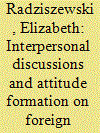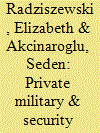| Srl | Item |
| 1 |
ID:
131057


|
|
|
|
|
| Publication |
2014.
|
| Summary/Abstract |
The paper investigates how states manage multiple rivalries when faced with immediate threats. We argue that accommodation of one rival allows states to shift resources from the management of another rival to deal with the costs of immediate threats. By examining enduring rivalries from 1966 to 1999, we show that states' reliance on accommodation in response to threats varies depending on the number of severe threats and the relative capabilities between the states and the threat-issuing rivals. Findings show that when faced with severe but few threats, states prefer to accommodate rivals that did not issue the threat. They are also more likely to give larger concessions to such rivals and to those issuing less severe threats. Finally, the greater the military capability of a rival issuing a severe threat relative to that of the challenged state, the more likely that a threatening rival is accommodated.
|
|
|
|
|
|
|
|
|
|
|
|
|
|
|
|
| 2 |
ID:
119676


|
|
|
|
|
| Publication |
2013.
|
| Summary/Abstract |
This paper examines Polish support for the country's participation in the Iraq war in 2004. I argue that interpersonal discussions are a driving force behind emergent attitudes on foreign policy, such as support or opposition to war. I identify three mechanisms through which political discussions can influence individual's views on the war and develop hypotheses about the impact of kinship ties and frequency of discussions on strengthening the influence. I test my argument using the first large-N data on interpersonal discussions and foreign policy outside of the US context. Findings demonstrate that having a pro-war conversation partner greatly increases the probability that one will adopt similar views. They also show that when one's social environment is taken into account as the source of information about the policy, the impact of mass media diminishes.
|
|
|
|
|
|
|
|
|
|
|
|
|
|
|
|
| 3 |
ID:
179932


|
|
|
|
|
| Summary/Abstract |
PMSC training has the potential to improve state capacity, reduce the combatants’ opportunity and willingness to fight, and prolong the duration of peace. However, the benefit of PMSC training-related intervention over other types of PMSC interventions depends on the level of conflict complexity. Analysis of novel data on PMSC interventions and peace episodes following major/minor civil wars (1990–2008) shows that in cases when PMSCs intervene, training makes a positive contribution to peace in wars with a limited number of rebel groups that do not resort to terrorism. Positive impact dissipates in conflicts with greater levels of rebel fragmentation and terrorist tactics.
|
|
|
|
|
|
|
|
|
|
|
|
|
|
|
|
| 4 |
ID:
124139


|
|
|
|
|
| Publication |
2013.
|
| Summary/Abstract |
The article analyzes the impact of private military companies (PMCs) on the duration of civil wars in Africa from 1990 to 2008. We develop an "opportunity structure" theory to argue that while PMCs are profit-oriented entities, the prevalent opportunities in conflicts will determine how they behave in war zones. Empirical findings for civil wars with at least 1,000 battle deaths show that as level of competition among government-hired PMCs increases, they are more likely to deliver optimal services and help bring an end to violence. In the absence of competition, the prevalent structure creates opportunities for PMCs to underperform in order to maximize profits by staying in conflicts longer. The authors also show that swift cessation of hostilities could benefit those profit-seeking PMCs that are compensated with contracts to extract natural resources because resource extraction generates more wealth in peace time. In such cases, the prevalent opportunities in conflict create an incentive for companies to deliver optimal service and terminate hostilities.
|
|
|
|
|
|
|
|
|
|
|
|
|
|
|
|
| 5 |
ID:
154926


|
|
|
|
|
| Summary/Abstract |
We examine what leads states to accommodate enduring, international rivals in response to immediate threats. Drawing from network theory, we hypothesize that the direct and indirect ties the threatened state’s rivals form with each other and with other states in the global system play a critical role in shaping crisis. A threatened state should be more likely to accommodate rivals with economic connections to other actors. These connections generate influence, through leverage or information that can lead to crisis de-escalation. A threatened state is less likely to accommodate a rival that has military alliances with other rivals because credible allies are less likely to respond to such overtures. We use network analysis and data from the post–Cold War era to support the argument, shedding light on the importance of local and global connectivity in conflict management.
|
|
|
|
|
|
|
|
|
|
|
|
|
|
|
|